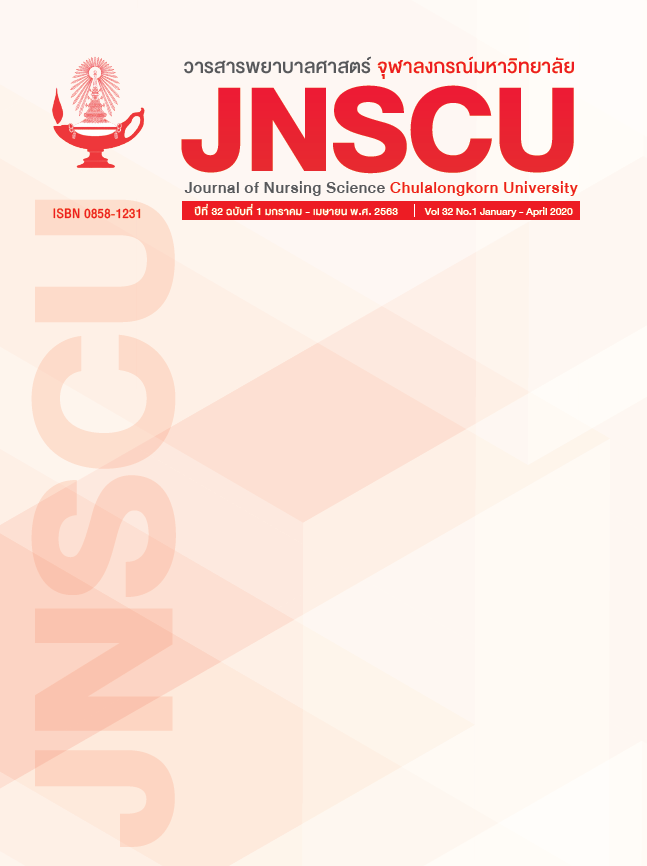บทบาทพยาบาลในการดูแลผู้ป่วยโรคซึมเศร้า การดูแลตนเองของผู้ป่วยและการมีส่วนร่วมของครอบครัวและชุมชน
คำสำคัญ:
โรคซึมเ, บทบาทพยาบาล, การดูแลตนเอง, การมีส่วนร่วมของครอบครัวและชุมชนบทคัดย่อ
โรคซึมเศร้า (Major Depressive Disorder) เป็นสาเหตุของการเจ็บป่วยและการไร้ความสามารถที่สำคัญของทุกประเทศทั่วโลก ซึ่งพบได้ในประชากรทุกเพศ ทุกวัย โดยนับวันยิ่งจะมีจำนวนผู้ป่วยเพิ่มมากขึ้นอย่างต่อเนื่อง ซึ่งส่งผลกระทบต่อตัวผู้ป่วยเองไม่ว่าจะเป็นด้านร่างกาย อารมณ์ ความคิดและพฤติกรรม ผู้ป่วยจะมีอารมณ์เศร้า เบื่อหน่าย ท้อแท้ สิ้นหวัง เบื่ออาหาร น้ำหนักลด หรือรับประทานอาหารมากขึ้น สมาธิไม่ดี นอนไม่หลับหรือนอนมากเกินไป มองทุกอย่างในแง่ลบ รู้สึกไร้ค่า ซึ่งในระยะยาวอาจนำไปสู่การฆ่าตัวตายได้ในที่สุด และยังส่งผลกระทบต่อครอบครัว และสังคม เนื่องจากผู้ป่วยมีความบกพร่องในการปฏิสัมพันธ์กับคนในครอบครัว เกิดความไม่เข้าใจกัน การทะเลาะเบาะแว้ง การหย่าร้าง รวมทั้งการทำหน้าต่าง ๆ ในสังคมบกพร่อง ไม่สามารถทำงานได้ ทำให้รัฐบาลต้องรับภาระในการดูแล พยาบาลถือเป็นบุคลากรทางสุขภาพคนหนึ่งที่มีบทบาทสำคัญในการดูแลผู้ป่วย ดังนั้นพยาบาลควรต้องศึกษาหาความรู้ ทำความเข้าใจโรคซึมเศร้า เพื่อให้การพยาบาลผู้ป่วยได้อย่างถูกต้อง ตลอดจนหากครอบครัวและชุมชนมีส่วนร่วมในการดูแลประคับประคองผู้ป่วย มีความรู้ความเข้าใจเกี่ยวกับโรคซึมเศร้า มี จะเป็นส่วนสำคัญที่จะช่วยให้ผู้ป่วยหายได้เร็วขึ้น และลดอัตราการกลับมาเป็นซ้ำของผู้ป่วยได้
เอกสารอ้างอิง
1. Depression. [Internet]. Switzerland: World Health Organization; 2019 [cited 2019 Jun 11]. Available from: https://www.who.int/news-room/fact-sheets/detail/depression
2. World Health Organization. Depression and Other Common Mental Disorder [Internet]. Switzerland: World Health Organization; 2017 [cited 2019 Jun 11]. Available from: https://apps.who.int/iris/bitstream/handle/10665/254610/WHO-MSD-MER-2017.2-eng.pdf
3. Vigo D, Thornicroft G, Atun R. Estimating the true global burden of mental illness. Lancet psychiatric [Internet]. 2016 Feb [cited 2019 Jun 11]; 3: 171-178. Available from: https://www.thelancet.com/pdfs/journals/lanpsy/PIIS2215-0366(15)00505-2.pdf.
4. Depression. [Internet]. Egypt: World Health Organization Regional Office for the Eastern Mediterranean; 2019 [cited 2019 Jun 11]. Available from: http://www.emro.who.int/health-topics/depression/index.html
5. Burden of Disease Research Program Thailand. Disability-Adjusted Life Years: DALYs: Report of Burden of disease and injuries among the Thai population in 2014 [Internet]. Nonthaburi: International Health Policy Program; 2012 [cited 2019 June 13]. Available from: http://bodthai.net/download/รายงานภาระโรคและการบาด/ (in Thai)
6. Department of Mental Health. Prevalence of mental disorders and mental health problems: Results from Thai national mental health survey 2013 [Internet]. Nonthaburi: Department of Mental Health, Ministry of Public Health; 2016 [cited 2019 June 11]. Available from: https://www.dmh.go.th/ebook/files/prevalence_of_M_disorder_MH_problems_TNMHS2013.pdf (in Thai)
7. Department of Mental Health. Depression [Internet]. 2016 [cited 2019 May 21]. Available from: www.searo.who.int/thailand/news/technical-factsheet-depression-thai.pdf?ua=1 (in Thai)
8. World Health Organization. OUT OF THE SHADOWS Making Mental Health a Global Development Priority [Internet]. Washington DC: World Health Organization; 2016 [cited 2019 Jun 11]. Available from: http://www.who.int/mental_health/WB_WHO_meeting_2016.pdf
9. Lalitanantapong D. Emergency Psychiatry. Bangkok: Chulalongkorn University Printing House; 2018. (in Thai)
10. American Psychiatric Association. Diagnostic and statistical manual of mental disorder. 5th ed. Washington, DC: American Psychiatric Association; 2013.
11. Vongsirimas N, Kaesornsamu P. Nursing Care for Persons with Depressive Disorders and Bipolar Disorders. In: Sitthimongkol Y, Kaesornsamu P, Vongsirimas N, Pornchaikate A, editors. Psychiatric Nursing. 3rd. Bangkok: Scan Art Co., Ltd.; 2016. p. 319-48. (in Thai)
12. Boyd MA. Psychiatric Nursing: Contemporary Practice. 6th ed. Philadelphia: Wolters Kluwer; 2018.
13. Halter MJ. Vacarolis’ Foundations of Psychiatric-Mental Health Nursing: A Clinical Approach. 8th ed. St. Louis, Missouri: Elsevier; 2018.
14. Ittasakul P, Hongsanguansri S. Depressive Disorders. In: Lotrakul M, Sukanich P, editors. Ramathibodi Essential Psychiatry. 4th. Bangkok: Department of Psychiatry, Faculty of Medicine Ramathibodi Hospital; 2015. p. 167-89. (in Thai)
15. Wannasewok K. Bipolar and Related Disorder and Depressive Disorder. In: Sitdhiraksa N, Wannasewok K, Wannarit K, Pukrittakayamee P, Apinuntavech S, Katumarn P, editors. Siriraj Psychiatry DSM-5. 3rd. Bangkok: Department of Psychiatry, Faculty of Medicine Siriraj Hospital; 2016. P. 379-410. (in Thai)
16. Jiebna V. Psychopharmacotherapy and Nursing. In: Jiebna V, editor. Psychiatric Nursing. Bangkok: Chulalongkorn University Printing House; 2013. p. 119-46. (in Thai)
17. Thapinta D. Depression: Therapy and Cognitive Behavior Counseling. 3rd. Chiang Mai: Wanida Printing; 2013. (in Thai)
18. Arunpongpaisal S, Vasiknanonte S, editors. Textbook of depressive disorders. Khonkaen: Klungnana Vitthaya Press; 2015. (in Thai)
19. Phanasathit M. Depressive Disorders. In: Charernboon T, Nuallaong W, Jaisin K, editors. Thammasat Textbook of Psychiatry. Pathum Thani: Department of Psychiatry, Faculty of Medicine Thammasat University; 2019. p. 143-55. (in Thai)
20. Akwarangkoon S, Khunarak U. Depression and Nursing Therapeutics. In: Akwarangkoon S. Psychiatric and Mental Health Nursing: Science and Art of Practice 1. 3nd. Nakhon Si Thammarat: Threelada Printing; 2016
เผยแพร่แล้ว
ฉบับ
ประเภทบทความ
สัญญาอนุญาต
ลิขสิทธิ์ (c) 2021 วารสารพยาบาลศาสตร์ จุฬาลงกรณ์มหาวิทยาลัย

อนุญาตภายใต้เงื่อนไข Creative Commons Attribution-NonCommercial-NoDerivatives 4.0 International License.
##default.contextSettings.thaijo.licenseTerms##


